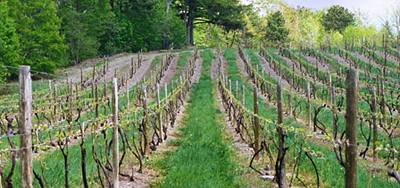Vines and wines program launches quarterly e-newsletter
By Amanda Garris

Look for the latest on vines and wines at Cornell in a new quarterly e-newsletter -- "Appellation Cornell" -- named after the term for a geographic region designated for quality wine production.
"We started 'Appellation Cornell' to inform [people] about Cornell's research, extension and teaching programs and the scientists leading them," says Tim Martinson, co-editor and senior extension associate in Cornell's viticulture and enology (VIEN) program.
Readers can access such features as faculty and student profiles, news from the recently established undergraduate program and reports on Cornell collaborations with the grape and wine industry. They will also be able to stay abreast of upcoming meetings, workshops and short courses.
"We especially want to make the science useful and relevant to the growers and winemakers who produce wine and juice products," says Martinson.
Those more technically inclined will find articles that link research to vineyard and winery management. Each issue will contain an article about emerging research in cool climate wine and grape production. For example, the first issue tackles green flavors (unwanted flavors in some red wines, attributed in part to certain chemical compounds that come in with the fruit) in wine. In addition, recent publications by VIEN faculty will be summarized with key conclusions.
Cornell has been offering an undergraduate VIEN major in the College of Agriculture and Life Sciences since 2008, making it the only four-year undergraduate degree program in the United States east of the Rocky Mountains and filling the cool climate niche. Currently, 21 students -- many from grape-growing and winemaking families from New York, California, Chile, as well as newer wine regions of the eastern United States -- major in VIEN. That number is expected to nearly triple when the program reaches maximum capacity, says Ian Merwin, professor of horticulture and director of the VIEN undergraduate program.
"Our goal is to recruit top-quality students and help them become the next generation of leaders and innovators for cool climate wine growing throughout North America," Merwin says.
Producing quality grapes and wines in New York state means coping with a wide range of environmental, biological and economic challenges. Cornell graduates will be well-prepared to tackle problems both in New York and elsewhere, according to Merwin.
The VIEN program also recently debuted a redesigned Web site, streamlining access to all information on grapes and wine at Cornell. The site includes information on the undergraduate major, graduate study, faculty and staff research, and extension -- no small feat considering Cornell has more than 40 researchers and extension personnel working on topics from breeding new grapes to winery economics.
VIEN outreach publications on the Web site include "Appellation Cornell," "Cellar Dweller" and "Veraison to Harvest," as well as the new "2010 Production Guide for Organic Grapes" and the "New York Guide to Sustainable Viticulture Practices Grower Self-Assessment Workbook." The site allows VIEN associates to post such Web content as newsletters, podcasts and video.
"Ten years ago the New York Wine and Grape Foundation identified the relationship with Cornell as key for the industry," says Peter Saltonstall, owner of King Ferry Winery. "With the investment in enology and viticulture at Cornell under Dean Susan Henry, we are now working together on the challenge ahead to build economic sustainability in our industry."
Amanda Garris is an adjunct assistant professor of horticulture at Cornell.
Media Contact
Get Cornell news delivered right to your inbox.
Subscribe